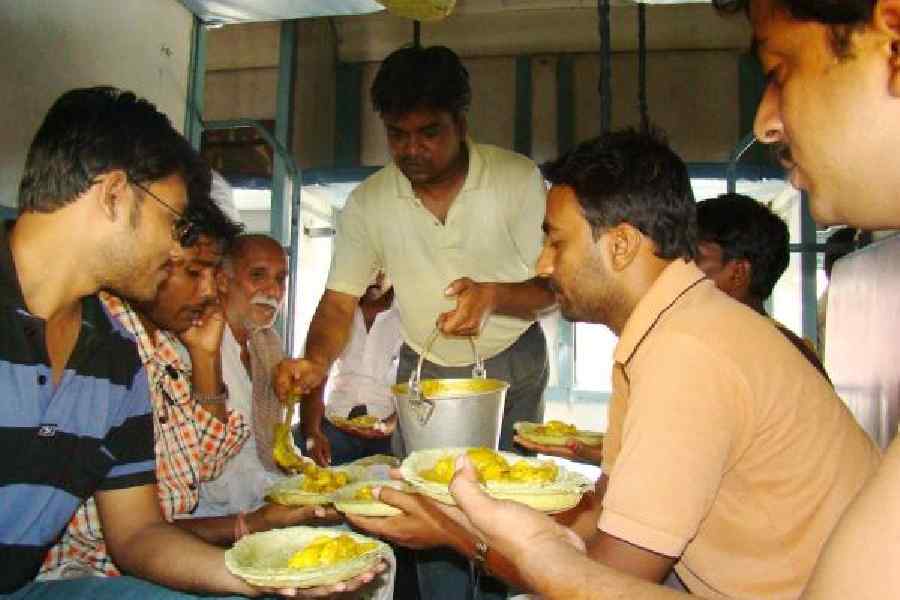Food on wheels
Sir — Give Indians an inch and they will want to take a mile. A woman passenger has been fined for using the power outlets in train compartments to run an electric kettle and cook Maggi in it. This could be a serious safety hazard as those outlets cannot take that kind of load. More important, carrying food from home used to be a simple and but pleasurable part of every journey. Families packed steel tiffins with luchi, aloo’r tarkari, mete chorchori and so on. This is not to mention the anticipation of getting off at stations and sampling delicious local fare like the kachori subzi at certain stations.
Arun Gupta,
Calcutta
Fatal precedent
Sir — Earlier this month, the Uttar Pradesh government decided to withdraw its case against all the accused in the lynching of Mohammad Akhlaque. This signals a retreat from the idea that the State must stand firmly with victims of violence. The incident marked a grim and communal turn in India’s public life. The Uttar Pradesh government appeared hesitant to side with the victim from the start, which set a troubling precedent for every similar attack that followed. A decade later, the withdrawal request frames the victim as incidental. Institutions must hold firm because justice shaken today invites chaos tomorrow. A democratic society deserves better custodianship.
N. Nagarajan,
Secunderabad
Sir — The withdrawal plea in the Dadri case undermines the very structure of criminal justice. Witnesses reported inadequate security, which raises questions about how the State protected those who came forward. A prosecution process cannot function in an atmosphere of fear. The accused enjoyed political patronage which amplified these anxieties. A court may rule on procedure, yet the public sees the larger drift. Selective commitment to justice chips away at trust quicker than any speech can restore it. A system that bends too easily risks losing its spine.
A.K. Chakraborty,
Guwahati
Sir — Cow vigilantism entered the public discourse in India after Mohammad Akhlaque’s lynching and it has grown into a normalised menace. People have faced harassment, assault and even death over suspicion alone. Some victims were booked instead of protected. This pattern has warped social relationships because every rumour now carries the threat of violence. The withdrawal of prosecution feeds a sentiment that certain crimes lack urgency. That sentiment spreads fast in volatile environments. Citizens deserve reassurance that the law still holds its ground.
Md. Imdadullah,
Muzaffarpur, Bihar
Heated debate
Sir — The fight between the Congress and the Bharatiya Janata Party over the removal of the word, “great”, from the names of the Mughal emperor, Akbar, and the ruler of Mysore, Tipu Sultan, from new textbooks issued by the National Council of Educational Research and Training has turned into a needless political quarrel instead of a reasoned discussion on education. The argument touches on how history is shaped for young minds. These rulers influenced broad stretches of the subcontinent through policy, diplomacy and warfare, and their legacies deserve clear context rather than cosmetic edits. Titles neither erase nor embellish historical truth. Students require honest explanations instead of symbolism that fuels political agendas more than scholarship.
Shrestho Ghosh,
Calcutta
Sir — The debate over NCERT revisions exposes a persistent attempt to narrow the view of India’s past. Edits that quietly remove sensitive periods weaken the purpose of a history education. The Mughal era, the Babri demolition and the Gujarat riots are not optional chapters. They are essential to understanding power, conflict and consequence. A textbook that replaces inquiry with silence does not serve any purpose. Children need a full account, even when it challenges present-day comfort. That responsibility cannot be bargained away for political convenience.
Jayanta Sinha,
Calcutta
Green spot
Sir — The expansion plan for Udhwa Lake Bird Sanctuary in Jharkhand offers a hopeful moment for conservation in a region that often receives little attention. The wetland sits on a major migratory route and shelters more than 160 species, yet earlier facilities barely matched its ecological value. New hideouts, watchtowers and cottages can draw visitors while giving researchers stable access. The crucial task lies in balancing tourism with fragile habitats. A Ramsar site deserves care that strengthens both biodiversity and livelihoods, rather than turning into another crowded picnic spot.
Anupam Neogi,
Calcutta
Sir — The forest department’s investment in better infrastructure for the Udhwa Lake Bird Sanctuary is sensible. But migratory birds from Siberia and Central Asia depend on Udhwa’s lakes for rest and food. Increased footfall risks disturbing these cycles. Strict visitor limits, guided trails and proper monitoring are needed.
Asim Boral,
Calcutta










